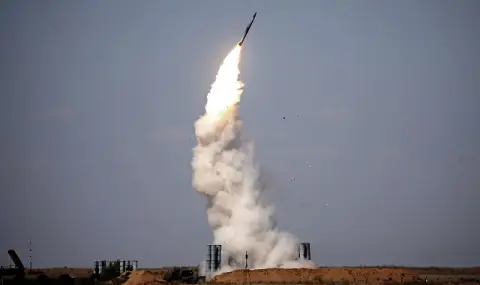Russian forces carried out a large series of missile and drone strikes against Ukrainian energy infrastructure on the night of January 14-15.
The Ukrainian Air Force reported that Russian forces fired 74 Shahed and other strike drones and 43 missiles against Ukraine, including one Iskander-M ballistic missile from Belgorod region, seven Kh-22/32 cruise missiles from the airspace over Tula region, four Kalibr cruise missiles from the airspace over Tula region, and four Kalibr cruise missiles from the airspace over Tula region. from ships in the Black Sea, 27 Kh-101/55SM cruise missiles from the airspace over the Volgograd region and four Kh-59/69 cruise missiles from the airspace over the Belgorod region.
This is what the Institute for the Study of War (ISW) wrote in its latest analysis of the course of hostilities.
The Ukrainian Air Force reported that they shot down 23 Kh-101/55SM missiles, three "Caliber" missiles, four Kh-59/69 missiles and 47 drones, and 27 drones did not hit their targets. Ukrainian President Volodymyr Zelenskyy said the Russian strikes targeted energy infrastructure.
Ukrainian authorities reported damage to energy and critical infrastructure facilities in Ivano-Frankivsk, Kharkiv and Lviv regions and residential areas in Kirovohrad region.
Ukrainian Energy Minister German Galushchenko and Ukrainian state-owned electricity transmission operator Ukrenergo reported temporary emergency shutdowns in Kharkiv, Sumy, Poltava, Donetsk, Zaporizhia, Dnipropetrovsk and Kirovohrad regions on the morning of January 15 due to the strikes.
Ukrainians still have to limit their energy consumption.
The institute recalls that Russia has regularly attacked Ukrainian energy infrastructure in large series of strikes since the winter of 2022-2023, likely in an attempt to limit defense industrial capacity and break Ukrainians' will to beating.
Ukraine and Russia held a "one-for-one" prisoner exchange on January 15, their first in 2025. Zelensky announced on January 15 that Ukraine had received 25 Ukrainians suffering from serious wounds and illnesses. He said the United Arab Emirates (UAE) had brokered the exchange. Ukraine's Coordination Headquarters for the Treatment of Prisoners of War reported that Ukraine had received a civilian previously captured by Russian forces during the exchange. The Russian Ministry of Defense (MOD) reported that Russia had received 25 Russian prisoners of war.
Ukrainian Commissioner for Human Rights Dmytro Lyubinets announced on January 6 that Ukraine and Russia had reached a preliminary agreement to hold a regular prisoner exchange in 2025. and that Ukraine will prioritize the return of seriously ill and wounded Ukrainians.
A Russian source claims that Ukrainian drones and artillery capabilities are giving Ukrainian tanks a tactical advantage over Russian tanks in unspecified selected areas of the front line. A Russian blogger stated on January 12 that Russian forces are unable to place tanks and armored vehicles in frontline areas where Ukrainian forces have sufficient shells due to the high accuracy of Ukrainian artillery strikes. The blogger complained that Russian drones are less effective than Ukrainian drones and that the Russian military command is supplying Russian FPV operators only with advanced FPV models operating on non-standard frequencies and optical drones — both of which are more resistant to Ukrainian electronic warfare — to priority sectors of the front line.
Furthermore, the blogger claims that the insufficient amount of Russian artillery, combined with the insufficient capabilities of Russian drones in selected sectors of the front line, allows Ukrainian forces to position tanks more easily for indirect and direct fire.
Ukraine's ability to damage and destroy Russian armored vehicles and tanks with FPV drones and artillery will likely strain Russia's ability to compensate for these losses due to the current pace of production.
The President of Transnistria, Vadim Krasnoselsky, announced on January 15 that Russia would soon provide Transnistria with gas as "humanitarian aid", but did not specify the date or method of delivery. He visited Moscow from January 10 to 14 and negotiated possible gas supplies to Transnistria with the Russian Ministry of Energy. Russia will provide Transnistria with enough gas for heating, industrial enterprises and civilian purposes, noting that it will not supply the rest of Moldova.
Armenia continues to improve relations with its Western partners amid deteriorating relations with Russia. The U.S. State Department announced on January 14 that the two countries’ governments have established the U.S.-Armenia Strategic Partnership Commission, signaling a significant step in their bilateral relations.
U.S. Secretary of State Anthony Blinken and his Armenian counterpart Ararat Mirzoyan formalized the agreement aimed at expanding bilateral cooperation in the economic, security, defense and governance sectors. Blinken stressed U.S. support for Armenia’s sovereignty and territorial integrity, while Kremlin spokesman Dmitry Peskov criticized the partnership agreement, accusing the U.S. of destabilizing the South Caucasus.
Russian Deputy Prime Minister Alexei Overchuk and Foreign Minister Sergei Lavrov also expressed dissatisfaction with the Armenian government’s approval on January 9 of a bill on Armenia’s accession to the European Union (EU). Overchuk and Lavrov argued that Armenia’s potential future membership in the EU is incompatible with Armenia’s membership in the Russian-led Eurasian Economic Union (EAEU) and framing Armenia’s EU accession bill as a potential withdrawal from the EAEU.
Overchuk and Lavrov also argued that such decisions are Armenia’s sovereign right, but stressed the potential consequences, reinforcing the Kremlin’s long-standing pattern of threatening and pressuring neighboring countries through indirect and direct means. The Kremlin’s responses to Armenia’s deepening ties with the West demonstrate a broader Russian strategy of undermining the sovereignty of neighboring and formerly colonized states through initial ultimatums and veiled coercion, often escalating to direct action and military violence when Russia’s influence is challenged. As is the case in Georgia, Moldova, and Ukraine.
